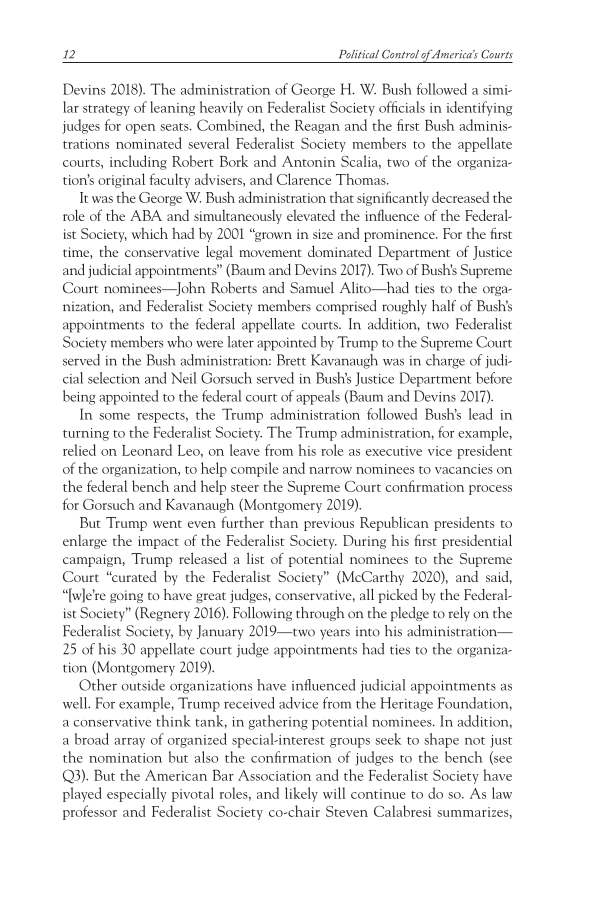12 Political Control of America’s Courts Devins 2018). The administration of George H. W. Bush followed a simi- lar strategy of leaning heavily on Federalist Society officials in identifying judges for open seats. Combined, the Reagan and the first Bush adminis- trations nominated several Federalist Society members to the appellate courts, including Robert Bork and Antonin Scalia, two of the organiza- tion’s original faculty advisers, and Clarence Thomas. It was the George W. Bush administration that significantly decreased the role of the ABA and simultaneously elevated the influence of the Federal- ist Society, which had by 2001 “grown in size and prominence. For the first time, the conservative legal movement dominated Department of Justice and judicial appointments” (Baum and Devins 2017). Two of Bush’s Supreme Court nominees—John Roberts and Samuel Alito—had ties to the orga- nization, and Federalist Society members comprised roughly half of Bush’s appointments to the federal appellate courts. In addition, two Federalist Society members who were later appointed by Trump to the Supreme Court served in the Bush administration: Brett Kavanaugh was in charge of judi- cial selection and Neil Gorsuch served in Bush’s Justice Department before being appointed to the federal court of appeals (Baum and Devins 2017). In some respects, the Trump administration followed Bush’s lead in turning to the Federalist Society. The Trump administration, for example, relied on Leonard Leo, on leave from his role as executive vice president of the organization, to help compile and narrow nominees to vacancies on the federal bench and help steer the Supreme Court confirmation process for Gorsuch and Kavanaugh (Montgomery 2019). But Trump went even further than previous Republican presidents to enlarge the impact of the Federalist Society. During his first presidential campaign, Trump released a list of potential nominees to the Supreme Court “curated by the Federalist Society” (McCarthy 2020), and said, “[w]e’re going to have great judges, conservative, all picked by the Federal- ist Society” (Regnery 2016). Following through on the pledge to rely on the Federalist Society, by January 2019—two years into his administration— 25 of his 30 appellate court judge appointments had ties to the organiza- tion (Montgomery 2019). Other outside organizations have influenced judicial appointments as well. For example, Trump received advice from the Heritage Foundation, a conservative think tank, in gathering potential nominees. In addition, a broad array of organized special-interest groups seek to shape not just the nomination but also the confirmation of judges to the bench (see Q3). But the American Bar Association and the Federalist Society have played especially pivotal roles, and likely will continue to do so. As law professor and Federalist Society co-chair Steven Calabresi summarizes,
Document Details My Account Print multiple pages
Print
You have printed 0 times in the last 24 hours.
Your print count will reset on at .
You may print 0 more time(s) before then.
You may print a maximum of 0 pages at a time.

































































































































































































































